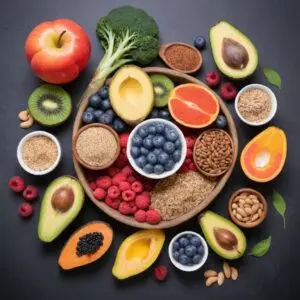Table of Contents
Things to Know about Vitamins and Supplements for Brain Health
I’m here to guide you through the maze of information about vitamins and supplements for brain health. My aim is to provide the truth, backed by solid evidence, about how certain nutrients can influence cognitive function. With brain health a growing concern for many, it’s important to sift through the noise and find what genuinely works.
In this era of instant information, myths about vitamins and brain health are widespread. It can be tough to pinpoint what is actually beneficial versus what’s simply a well-marketed placebo. I’ll help you understand what to look for in credible sources so you can make informed decisions about your mental well-being.
Remember, reliable knowledge is just as vital as the vitamins you may consider taking. Let’s cut through the myths and lay out the facts clearly. Armed with the right information, you’ll be able to make decisions that contribute positively to your overall brain health.
As we move forward, keep an open mind but stay cautious. Not all supplements are created equal, and some carry more weight than others when it comes to scientific support for their claims. I’ll take the guesswork out of it for you. Now, let’s transition to examining the pivotal role of essential vitamins in maintaining and improving brain function.
Essential Vitamins: The Building Blocks of Brain Function
Our brains are complex machines requiring specific nutrients to function optimally. Amidst these, certain vitamins play starring roles in maintaining cognitive health. Understanding these vital nutrients helps us support our brain function and protect it as we age.
Vitamin B12 emerges as a cognitive champion, known for its role in producing brain chemicals that affect mood and other brain functions. A deficiency might lead to confusion and fatigue, so ensuring adequate intake is crucial for mental clarity.
Next up is Vitamin D, often dubbed the ‘sunshine vitamin’ for its ability to be synthesized through sunlight exposure. It’s not just for bones; it also regulates brain health. Low levels of Vitamin D are linked to cognitive decline, making it a top priority for brain care.
Don’t forget the antioxidants. Vitamins C and E fight off free radicals which can lead to oxidative stress, a contributor to the aging brain. Regular consumption of antioxidant-rich foods is an excellent defence against cognitive decline.
Finally, though not vitamins in the traditional sense, omega-3 fatty acids are indispensable. Often found in fish oil supplements, they are akin to vitamins for the brain due to their role in building cell membranes in the brain and also for their anti-inflammatory properties.
Supplements and Cognition: Enhancing Mental Clarity
In my search for cognitive enhancement, I’ve come across various supplements that promise to sharpen the mind and improve memory. Here, I’ll share my findings on a few notable examples and what science says about their effectiveness.
Nootropics are often called ‘smart drugs’ and they’re gaining popularity. But what’s truth versus hype? One compound that’s been studied is Modafinil, prescribed for sleep disorders but often used off-label for cognitive enhancement. While it may improve alertness, it’s not without potential side effects and ethical considerations.
Ginkgo Biloba, a natural supplement, has a long history. Some studies suggest it may aid memory and cognitive speed, but results are mixed, and more research is needed before it can be recommended unreservedly.
For those looking to boost brainpower without pharmaceuticals, the combination of L-Theanine and caffeine is compelling. Found in tea, L-Theanine may promote relaxation without drowsiness, while caffeine is a well-known stimulant. Together, they could offer a modest boost in attention and focus, though they’re no magic pill.
Ultimately, research into supplements for brain health is ongoing, and it’s critical to approach the topic with a skeptical eye. Make sure to look for studies from reputable sources, and remember that what works for one person may not work for another.
Beyond Pills: Lifestyle Factors That Boost Brain Vitamins and Supplements
It’s essential to recognize that maintaining brain health isn’t solely reliant on vitamin intake from pills and supplements.
I want to discuss how everyday choices impact the absorption and efficacy of brain-boosting nutrients.
First, let’s talk about diet. Incorporating foods rich in Omega-3s, like salmon or flaxseeds, and antioxidant-packed berries can elevate the benefits you receive from supplements.
Physical exercise isn’t just about keeping the body fit. It also plays a crucial role in brain health, increasing blood flow to the brain and potentially enhancing the effects of supplements.
Sleep is non-negotiable when it comes to brain function. A well-rested mind can better utilize the vitamins and supplements you consume.
Additionally, engaging in stress-reduction techniques like meditation and mindfulness can create a fertile environment for cognitive supplements to work effectively.
As you move forward, knowing how lifestyle factors can amplify the impact of supplements will be a significant advantage. In the following section, I’ll provide you with a toolkit to navigate the market with confidence.
Navigating the Market: A Consumer’s Guide to Brain Health Supplements
The supplement industry is vast and varied, with countless options claiming to boost brain health. As you consider incorporating supplements into your regimen, remember QUALITY and SAFETY should always guide your choices. Certifications from organizations like the US Pharmacopeia (USP) can indicate that a product has been vetted for purity and potency.
It’s crucial to have an open dialogue with healthcare professionals before starting any new supplement. They can help you understand potential interactions with current medications and tailor recommendations based on your individual health status.
Sadly, the market also has its share of misleading marketing and outright scams. Educate yourself on the common red flags: exaggerated claims, lack of transparency about ingredients, and suspicious reviews. Trustworthy brands are usually upfront about their research and quality controls.
Instead of looking for a ‘magic pill’, approach brain health as a long-term investment. Start with a balanced diet, adequate sleep, and regular exercise. Then, consider supplements as complementary to your healthy lifestyle. Realistic expectations about the benefits and time frame are key to satisfaction with any brain health regimen. Every little bit helps, but it is unrealistic to expect any kind of supplement to be a band-aid for poor lifestyle choices.
Lastly, remember that brain health is personal. What works for someone else may not work for you. Build a regimen that takes into account your unique needs and lifestyle, and be ready to adjust as those needs change. With a thoughtful, informed strategy, you can confidently navigate the supplement marketplace to support your brain health.
Resources
- “Vitamins and Minerals for Brain Health”
Harvard T.H. Chan School of Public Health
Link - “The Role of Nutritional Supplements in Brain Health: A Review”
Journal of Nutrition, 2020
Link - “Top 5 Supplements for Brain Health”
Cleveland Clinic
Link - “Nutritional Supplements and Cognitive Function in the Elderly”
Frontiers in Aging Neuroscience, 2018
Link - “Vitamins for Brain Health: What Works and What Doesn’t”
WebMD
Link







This article provides a fantastic overview, now I’m curious about the role of other nutrients like magnesium and zinc. How do these minerals impact cognitive function, and should they be included in a brain-boosting regimen? Additionally, are there specific foods or dietary patterns that are particularly effective in supporting brain health beyond individual vitamins and supplements?
Thanks for stopping by Elica. Minerals like magnesium and zinc are definitely important for healthy brain function. You don’t need huge amount of these minerals but a lack of them will definitely impair healthy brain function.
In terms of healthy foods for brain function you might like to check out this article on the website for more information https://mentaledgelabs.com/top-10-superfoods-for-brain-health/